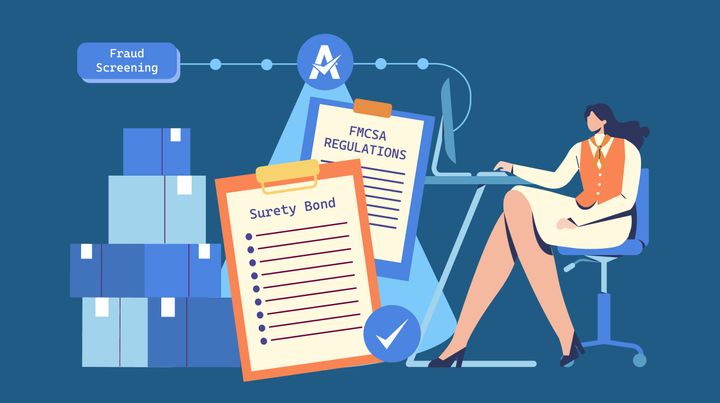Freight Broker Bonds & Compliance: What You Need to Know to Stay Legal (and Avoid Costly Mistakes)
Freight brokers play a crucial role in the supply chain—connecting shippers with carriers, negotiating rates, and keeping goods moving smoothly. But with great power comes great responsibility (and a lot of paperwork). One of the biggest hurdles for brokers? Staying compliant with freight broker bond requirements.
Fail to meet these regulations, and you could face fines, lawsuits, or even a shutdown of your business.
In this article, we’ll break down:
✔ What freight broker bonds are (and why they matter)
✔ Common compliance pitfalls (and how to avoid them)
✔ Recent regulatory changes you need to know
✔ Tips for keeping your brokerage running smoothly
Let’s dive in.
Freight Broker Bonds 101: The Basics
If you’re a freight broker, you’ve probably heard of the $75,000 freight broker bond—officially known as a BMC-84 bond. This isn’t optional. The Federal Motor Carrier Safety Administration (FMCSA) requires it as part of the licensing process.
Why Do You Need a Freight Broker Bond?
Unlike insurance, which protects you, a bond protects your customers (shippers and carriers). It’s a financial safety net that ensures:
- Carriers get paid (even if a broker goes bankrupt or disappears)
- Shippers are compensated if a broker fails to fulfill contractual obligations
- Fraudulent brokers are weeded out (since bonds require financial vetting)
Without one, you can’t legally operate as a freight broker.
Surety Bond vs. Trust Fund (BMC-85)
Some brokers use a BMC-85 trust fund instead of a bond. Both satisfy FMCSA requirements, but there are key differences:
| Factor | BMC-84 Bond | BMC-85 Trust Fund |
|---|---|---|
| Cost | Annual premium (1-5% of $75K) | Full $75K deposit |
| Liquidity | No cash tied up | Funds locked in trust |
| Claims Risk | Surety pays first | You pay from trust |
Most brokers prefer bonds because they’re cheaper upfront—you pay a small premium rather than locking up $75K. But if you have the capital, a trust fund avoids recurring fees.
Top Compliance Issues That Trip Up Brokers
Even with a bond, many brokers run into compliance headaches. Here are the most common mistakes—and how to avoid them.
1. Letting Your Bond Lapse
Your bond must be active at all times. If it expires and you don’t renew, the FMCSA can suspend your authority—meaning you can’t book freight until it’s reinstated.
✅ Fix: Set renewal reminders 60+ days in advance. Some surety companies auto-renew, but don’t rely on that.
2. Not Properly Vetting Carriers
FMCSA requires brokers to verify carriers’:
- Active MC number
- Insurance coverage
- Safety rating
If you hire an uninsured or unsafe carrier and something goes wrong, you could be liable—and your bond could be claimed against.
✅ Fix: Use tools like SaferWatch or Carrier411 to check carrier credentials before booking loads.
3. Ignoring State-Level Requirements
Some states (like California, Texas, and New York) have additional bonding or registration rules for brokers operating there.
✅ Fix: Check state regulations before expanding into new markets.
4. Poor Record-Keeping
FMCSA requires brokers to keep transaction records for 3 years, including:
- Rate confirmations
- Carrier agreements
- Proof of payment
If you’re audited and can’t produce these, you could face penalties.
✅ Fix: Use a digital freight management system (like AscendTMS or Trucker Tools) to automate record storage.
Recent Regulatory Changes Affecting Brokers
The transportation industry is always evolving—and so are the rules. Here’s what’s new:
✔ Increased Scrutiny on “Double Brokering”
Double brokering (when a carrier secretly re-assigns a load to another trucker) has surged, leading to fraud and non-payment claims. The FMCSA is cracking down, and brokers must verify carriers more carefully.
✔ Electronic Logging Device (ELD) Mandate Enforcement
While ELDs mainly affect carriers, brokers must ensure their partners comply—or risk delays and liability.
✔ Rising Bond Premiums for High-Risk Brokers
Surety companies are charging higher premiums (up to 5-10%) for brokers with:
- Poor credit
- Frequent bond claims
- No industry experience
How to Stay Compliant (Without Losing Sleep)
- Work with a Reputable Bond Provider
- Avoid “too good to be true” rates—some shady providers disappear when claims arise.
- Stick with A-rated surety companies (like Travelers or Liberty Mutual).
- Train Your Team on Compliance Basics
- Make sure dispatchers know how to verify carriers.
- Keep up with FMCSA updates (subscribe to their email alerts).
- Consider Freight Broker Compliance Software
- Tools like RMIS or MyCarrierPackets automate carrier onboarding and document tracking.
- Have a Claims Response Plan
- If a claim is filed against your bond, act fast—delays can lead to higher penalties.
Final Thoughts: Compliance Pays Off
Freight broker bonds and regulations might seem like red tape, but they exist for a reason—to protect the industry from fraud and ensure fair business practices.
By staying on top of compliance, you:
✔ Avoid costly fines and shutdowns
✔ Build trust with shippers and carriers
✔ Keep your brokerage running smoothly
The best piece of advice? Don’t cut corners. The few hundred dollars you “save” by skipping proper compliance could cost you thousands (or your entire business) later.
What’s your biggest compliance challenge as a broker? Let’s discuss in the comments!

